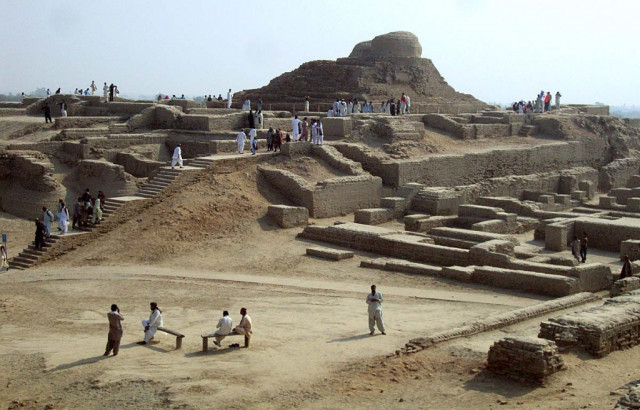Threats to heritage: Moen Jo Daro - ruined by ruins
The only Water and Soil Investigating Laboratory of Pakistan lying idle for 10 years.

A large number of people visiting the Stoppa a spot at Moen Jo Daro. PHOTO: APP
Though the Pakistan Peoples Party patron-in-chief, Bilawal Bhutto Zardari, and the provincial government have announced to save the historical site of Moen Jo Daro, the seriousness of the concerned quarters can be gauged by the fact that the only Water and Soil Investigating Laboratory of Pakistan in the area has been lying idle for the last 10 years.
The laboratory, which was established during the era of Zulfikar Ali Bhutto, to examine the underground water and soil at the ancient site of Indus Valley Civilisation, is deprived of all basic necessities, including the latest equipment.

The laboratory was meant to measure the organic material of the soil and water to examine clay, silt, sand, saline water and mud for the preservation of this historical site. "The laboratory was set up with the help of United Nations Educational, Scientific and Cultural Organisation (Unesco) because there had been no such facility at any laboratory in Pakistan. But, unfortunately, the laboratory could only run properly for a few years," said Dr Saeed Memon, hydrologist and member of technical consultative committee of national fund for Moen Jo Daro.
According to Memon, around 30 piezometers were installed to dig up samples of water and soil from various locations of the site for examination but, over time, most of the meters have either been damaged or filled with dust. "DR 2000 machine was donated by Unesco to check various ingredients of water and soil, but there was no technical person to run it. Finally, the people posted on the site damaged the machines, which are now non-functional," claimed Memon, adding that the technical consultative committee has asked the federal and provincial governments many times to restore the laboratory, without which the preservation work on the site is not possible. "It is highly recommended to use the mud of Moen Jo Daro for its preservation, but only after proper examination through the laboratory," he said, adding that the government should take the soil and water sample every month, especially during cold and dry weather to ascertain the level of salinity.
Officials of the archeology and culture department refuted the report that the laboratory was non-functional, but confirmed that it was ill-equipped due to the lack of modern technology. "A few machines are not properly working, but we are still taking water and soil samples," said the culture secretary, Saqib Soomro. "We have suggested a scheme for the upcoming financial year to get the latest equipment with a solar energy unit to prevent power fluctuations, which badly damages the equipment," he said, adding that they need computerised instruments.
Around six employees, including technicians and laboratory incharge are working over there. One of the senior officials working at Moen Jo Daro told The Express Tribune that not only equipment, but the laboratory lacked chemicals to conduct the test of water and soil. "How can we work without the necessary chemicals to test sub-surface water?" he said, adding that the site was located between River Indus and Dadu Canal and most of the people grow paddy crop around this site due to which water infiltrates into soil, causing damage to the site.
"Since the lab is non-functional, the conservation of the site is being done through traditional methods not scientific ways," said an official, requesting anonymity.
Sindh Archeology director Qasim Ali Qasim said that they have always used bricks of earth for the conservation of this site after the proper examination of the soil and water in a scientific manner.
Published in The Express Tribune, April 14th, 2014.



















COMMENTS
Comments are moderated and generally will be posted if they are on-topic and not abusive.
For more information, please see our Comments FAQ